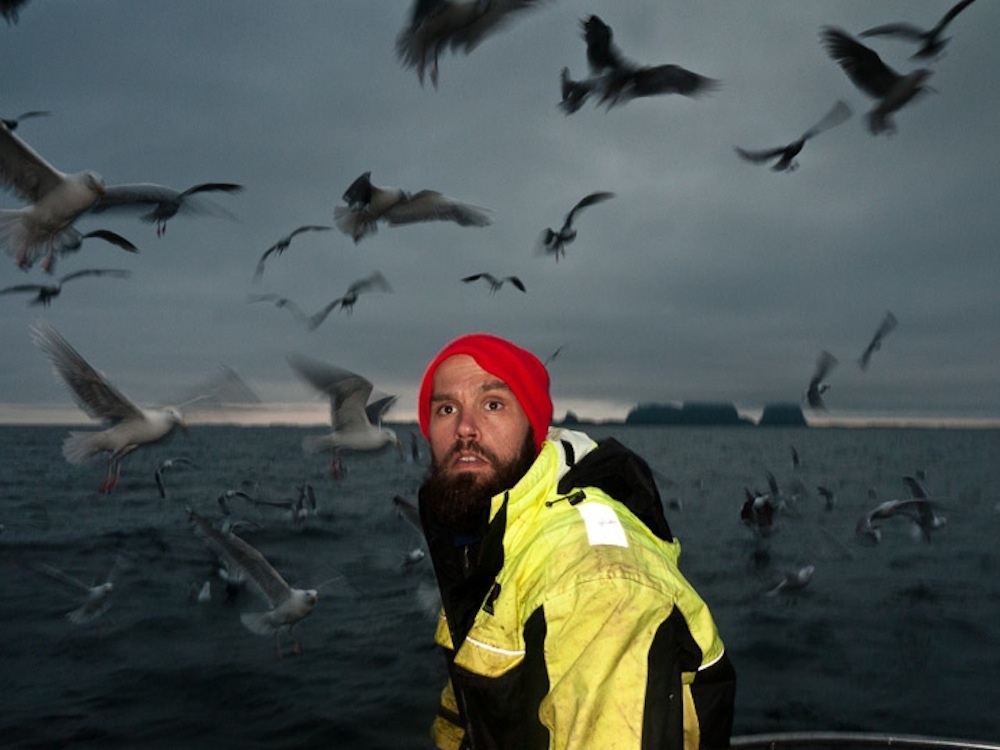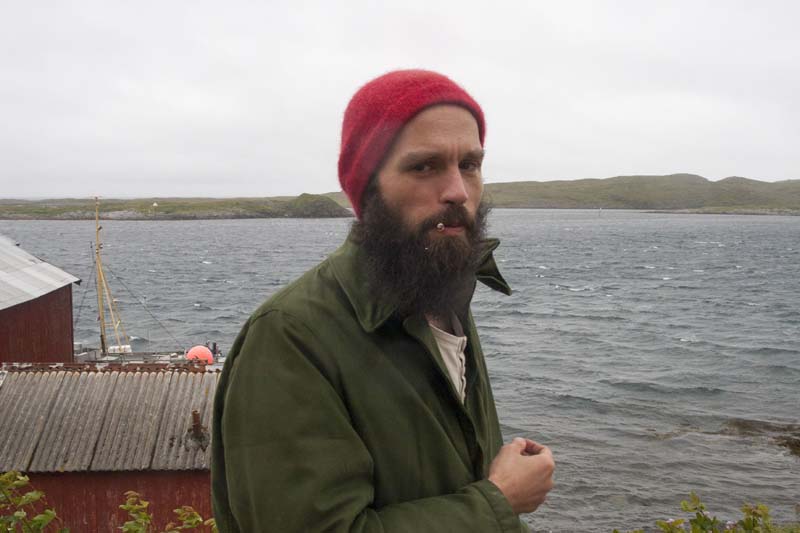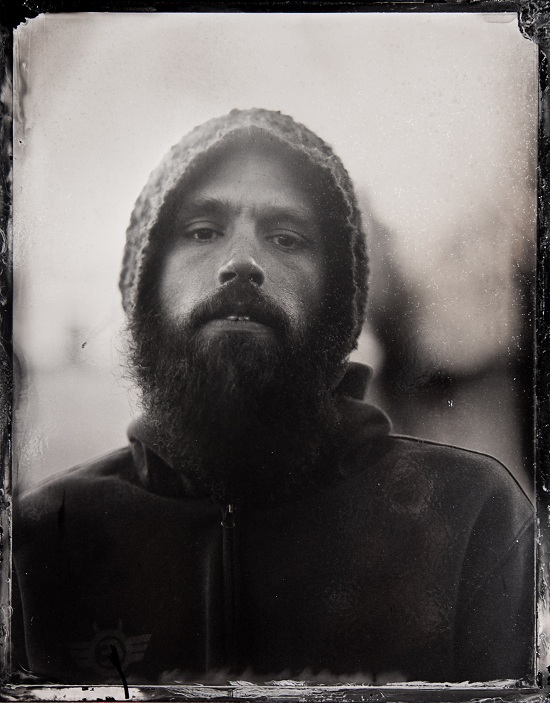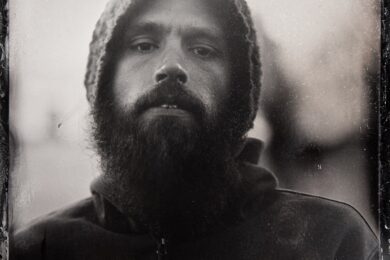Pinhole portrait of Erling by kind permission of Trond Kjetil Holst
Erling Ramskjell smokes cigarettes at all times. He may dress like a modern fisherman, but he looks like he’s on an evangelical mission for an old prophet. Yet if he does have a divine task at hand, you can’t tell; he speaks and moves extremely slowly and calmly, like he doesn’t have a care in the world. He claims with a wry grin that he was born in a secret location about two thirds of the way up Norway, some thirty-odd years ago. How true this is I don’t know, but certainly he speaks a relatively rare Northern dialect of Norwegian. This regional tongue is called saltsdakas and is only used by about 5,000 people, who all live in one agricultural valley on the cusp of the Arctic Circle. This dialect is understood by fewer of his countrymen than English, but this hasn’t stopped him from singing in it until recently or from carving out a modest career for himself, touring in the north of Norway as well as Hungary, Russia and other Eastern European locales, (usually performing as Ærling or even just Æ).
However everything has changed this year. His latest album – Fraillaments – is a departure for him in that it is sung in English – albeit a very poetic, fractured form of our language, full of neologisms, unusual contractions and fantastical grammatical and linguistic inventions.
Speaking about this unique use of his second (or perhaps, strictly speaking, third) language, Wyndham Wallace, writing for the Quietus, said: "Ramskjell’s use of English… has also allowed him to manipulate the language in an often fascinatingly unselfconscious fashion: ‘Words grow in my mouth,’ he sings on ‘Soulslipperism’, ‘wild venomous worms refuse to come out /Wriggling towards my brain instead’. Similarly, on ‘Bent By Rain’ he writes of how ‘the sky’s bent by rain / The colours outglow sunshine’. He also explores vocabulary… ‘And we see angels, princess / Where there are only trolls, frogs, witches’ (‘On Repeat’) – and he’s not scared of playfully sinking to sea level on ‘Island’ as well: ‘I’m an island / You’re a continent / The sea parts us /The sea can fuck off.’"
Musically the album is a mix of indie, folk, psych and prog recorded with his new band The Armageddonettes – friends made during his multiple tours of Eastern Europe, from the Armenian folk rock band Wattican Punk Ballet and Hungary’s live drum & bass group, Brains.
He grew up in a musical household with a father who was an occasional piano teacher. The home environment contained lots of instruments, which meant that he and his brother formed their first band when he was just six. He has, at various times since, been influenced by both The Beatles and Mayhem and many other groups in between. He now lives on the island of Husøy – where the annual Traena festival is held – which is reached by a three hour boat ride down fjord and out to sea from the Northern town of Bodø.
Both his birthplace and his current home are so far north that he experiences near total daylight at the height of summer and the opposite at winter. He tells me about his first visit to the Volcanic archipelago where he lives and works now. "My first experience [at Traena] was an interesting one. My band Schtimm were asked to play here in 2006 and we didn’t know anything about it before setting off from Bodø on the boat. The sea was like a mirror. Totally, totally flat sea. And totally sunny and warm. You could sit out on the deck of a fast moving vessel in your shirt sleeves."
"And of course, that was the only time the weather was ever like that… so God tricked me into moving here! I have been sent here by dark, dark forces…
"We do get some hours of near light during winter. This island is very open, so luckily you get a sense of space. We don’t actually see the sun during this period because of those goddamn mountains over there, but yeah, it gets lighter for about four hours a day. Then when darkness falls it is pitch black, it is pitch black for 20 hours a day. I am barely even aware at this point. All I am aware of is that I should try and see some of this light. I mean, the further north you go, the darker it is. If you get to the top of Norway there is no light at all. Maybe you get a tiny bit for half an hour. I was up there playing a few weeks ago and there you get a fleeting glimpse of daylight, and then in seconds it’s gone again.
"As a child I grew up along the same line of latitude, so I was born into this life. Still, it is very hard to get used to it. Some people, they find it difficult, but you have to roll with the punches. When it’s very light and you don’t have any blackness in your bedroom, it is also a source of confusion. You can tell it is night time but still your brain doesn’t care when your eyes see the light."
I speak to Erling on the most relaxing day of his year… the day after the Traena festival is over and smmer is at its perpetual height. We sit in his kitchen drinking tea, looking out over an inlet from the sea called Helvete (or Hell, in English).
What’s the attraction of being in a band, seeing as you’ve been in one since you were a school boy?
Erling Ramskjell: I don’t think it’s exactly the same thing as having a fantasy friend, being in a band, but it is in the same genre. You make things up. My first band itself was probably very crappy but the experience was great. They were very formative years. However my recollection of these days is quite blurred because music has always been with me. Today I can say there are only a few songs by other people – mainly punk – that I can play, so maybe I was cured of playing other people’s songs at a very early age.

Erling at sea, by Wyndham Wallace
When did you start playing as Æ?
ER: Quite recently for such a grown up man as myself in 2008. About the same time I decided to learn how to play the guitar to a decent level. I had always been a bass player, so five years ago I released my first album and since then I’ve released three studio albums, a double album and a live album recorded in the Traena Church.
How do you characterise the music of Æ?
ER: I make the music so I don’t have to characterise it! Singer/songwriting is a very bad translation for what it is called in Norwegian. Barding isn’t right either. Neither is being a troubadour. But you can call it text based music with few extra ingredients. I play live quite a lot. It’s mainly me and my guitar on tour. That’s an ok thing. I don’t like the phrase singer/songwriter, because it’s very corny when people call themselves that and sing in Norwegian. A few people do that. It was a big thing in Norway in the 1970s; these people were the equivalent of Bob Dylan or the protest singers. So it sounds as if you’re trapped in the 70s if you call yourself a singer songwriter. But that’s totally ok. It’s the same with pop music. It’s the same with rock music. What is pop music? What is rock music? Is Metallica rock music? Yes. Is Bill Hayley rock music? Yes. And everything in between. It’s ok to put a simple, not very ambitious label on what you do. What I make is music with lyrics that matter to me.
How easy is it for people from other parts of Norway to understand Saltdaskas?
ER: It depends. It’s very strange, you know? Norway has a long history with Denmark and the Swedish influence on Norway has been very big as well. More recently when TV came they showed a lot of Swedish children’s TV. So in Norway you can get exposed to that language, and written Norwegian is almost the same as written Danish, so we understand them quite well, but they don’t understand us. And it’s the same with the rest of Norway. We understand people from Oslo and the other big dialects, but not everyone understands us so well. So it’s not a very commercial thing for me to do. Yesterday I did sound for a band called Kråkesølv from Bodø who played in Traena Church during the festival, and they have a similar dialect to mine. I think they must be the first pop band in the last 20 years to make it in Norway singing in a Northern dialect, so you can see that I’m very provincial. I’m triple provincial. I’m singing in Norwegian, I’m singing in a Northern dialect and I’m not even singing in a Northern city dialect.
Is it folk music?
ER: The English definition of folk music is a bit blurry to us Norwegians – ourselves included. What it means in Norwegian is quite narrow. It means traditional music. But in the simplicity of it, I think so, yes. Hopefully not on the energy level but on the other side of progressive rock, that is where I sit and wait.
Tell me more about the church.
ER: It is dedicated for people to pray for the safe return of fishermen from sea. Fishing influences everything here and that includes the church. The ship that hangs in the church is a model of a boat from the area. Back in the heydays of the fishing barons, the big shots donated money to the church. They would have their own chairs in church. They would pay for their glory in the church. They have been removed now though. There are quite a few things to say about the building, but also the mentality of the church. I mean, I am an atheist. Well, atheist is a hard word… I don’t give a fuck about religion. There might be something, I don’t know. Like everyone else in life I am mistaken from time to time, so I think it doesn’t hurt to say ‘Maybe’ to things. If you say ‘Maybe’, you don’t get any surprises. But I think I will go to Hell of course if the Bible is correct. So I don’t have a religious bone in my body, but at the same time they are very tolerant people here. When Josh Pearson played here he was saying something about cock sucking in church and there weren’t any strong reactions to that here. There is some space here. Because when you are stuck on an island, you are stuck on an island. You have to learn to live with your neighbours; with the guy who fucked your wife, or the guy who beat you up at that last party. So I think it’s a more inclusive place, this church, than many other places. This year I’ve been the guy with the key to the church to make sure that the place is respected. Many people sit and drink booze on the stairs of the church, but it’s ok for the old ladies who go to the church to see that. It’s not a big thing. But people respect the church, and they drink with their beer can under their jacket.
Acoustically it’s good.
ER: Yeah, the wood is good. We recorded an album there in 2010. Stefan Sundström played live there and recorded an album there last year; that was a logistical hell.

Erling in front of Hell, by John Doran
How extreme is life on the island? Do you consider it to be extreme at all?
ER: The weather can be extreme. There are so many good stories about the weather, and I have seen extreme weather here. The roof of the sports hall blew off in a storm a few years ago. And of course the old timers say "This is nothing compared to the winter of 1856, when the whole island was moved three metres to the right." The risk if you’re a fisherman is still there. The second most dangerous job in Norway is offshore worker, and then you have fisherman as the most dangerous job. The people working on the factory ships are exposed to a lot of danger. I think the mortality rates among those on the smaller trawlers is something like 20 or 25 times higher than that of the average non-seabound Norwegian. Time changes, technology changes, the world moves forward. You will survive not going out for ten hours every single day even when the weather is really bad, so things do improve. But my neighbour, he is a fisherman, and he used to go with this other guy and each year they’d go a bit further up each year together, but the other guy just disappeared. They found his boat, but some monster wave just hit him. So death is really close. It’s very easy to be romantic about the tough sailing days that gives us this idea that we are tougher than the rest of the world, but there is a big uncertain element in your everyday life.
You do some fishing?
ER: Yes, but it’s been a while. I am an artist, and I have more and more of that to do and unfortunately less time to fish. I hope I am a better artist than I am a fisherman. I started at a very late age and my whole thought was that I had never had a hobby. I don’t like sport, I don’t like collecting stamps, I don’t desire anything else in life beside my work and music. In the same way other people play in hobby bands, I thought I should get a profession as a hobby. And doing something physical is a good thing. Music is so abstract. You never have a defined start and a defined end to it. It is just some string that you cut out little pieces of.
Why did you decide to change so radically from Æ to Erling And The Armageddonettes?
ER: Yes, it’s different. It’s a midlife crisis. I don’t take holidays… I should try that some time, to try and relax instead of thinking, "Right, I’ve done a double Norwegian album, now I must do something else." But I think this gives me more peace, to do something else. And I’d been hanging out in Budapest. I have some friends there. I’d gone there in 2009 with Schtimm. And there is a really good venue there called A38, I was invited to play there. It’s an old Soviet supply ship. That was very cool. It was aired on Hungarian TV. I’m the only North Norwegian artist to give a full concert on national Hungarian television. But I got to know a few people there. A Russian Armenian woman, great, great woman in all respects, she actually sang with me at the church concert. I don’t hire people… I cast them. Her brother is also the guy playing guitar on the album. And I went to see a band and the drummer was… wow… amazing. So at some point I started thinking, "Instead of going to Ibiza and sitting by a pool, it would give me much more peace of mind to go to Budapest and to see these people and to do an album."
But you use English in a very impressionistic, poetic fashion. You’re not bounded by the everyday meaning of words. You invent words, you smash words together… You say you’ve got limitations with speaking English, but I think you use this to your advantage.
ER: I hope so. I hope I won’t be caught red handed as a bad technician of English. If you think about the language you use when you’re singing, it’s very compressed. No one speaks on a daily basis how they sing. The musical language is very compressed. So you try to say things in a diversity of ways but in a very small space of words. So the difference between everyday speech and lyrics is bigger than the difference between the Norwegian lyrics and the English lyrics. And it’s a compression anyway, or an abstraction you perform when you write words to music. If you’re curious about languages and the written word, you try to figure stuff out. Some of it comes from buying vinyl, putting it on and reading the lyrics. You do this when you’re very young with a copy of the Oxford Reader’s Dictionary at hand. So it’s not necessarily a bigger or deeper understanding of a new language but it is a thorough understanding. So Iron Maiden pretty much taught me how to write lyrics. Later on it was punk records and Stephen King novels.
Why is whale meat and herring so unpopular among the middle classes in this country? If it’s a staple, why are people fed up with them?
ER: The word ‘fed up’ is quite apt in this situation. The post-war, pre-oil generation in this country was very poor before we became rich bastards, so people ate fish six or seven days a week. People didn’t have many options to conserve the fish before, so it was very much like salted herring and whale meat. And when whale goes bad, that must be one of the worst and most traumatic gourmet experiences anyone will ever have. But today it is a delicacy. But herring is something you use for bait and whale is something that is appropriate for dogs, according to old people, but it has changed quite a lot for younger people. We had a lot of meat eating generations, because when they got the chance to get out of the fish and potato hell… Chicken was a big thing for Norway and frozen pizzas. But fish, luckily, has gained some status again. Even cod. That is a very valuable fish here. The cod that comes from the Baring Sea comes here to mate in the Lofoten area and it takes a little tour down the Norwegian coast before they turn and go up to the Barents Sea again. They call that skrei. I talked to a fisherman up in the Vesterålen area near Lofoten, and this is very famous for its big, big amounts of cod. Comparatively, by the time they get to Lofoten, they are pretty much fucked. But this skrei has now become a trade mark. You can’t pull up one of those fish and say it is skrei. You have to have a certificate for it, you have to deliver it. There are only a few fishing factories that have the licenses that allow them to say they have skrei. It is only a matter of time before they give each fish a name and a press pack. So it has been taken to the complete opposite now, so it is actually very high class to eat cod.
I think the difference now is that the basic working class dishes are less about Catholic self-punishment. So you aren’t just eating the fish with some salt and potatoes, but you are having a more gourmet take on these traditional meals. Authentic? Yes, maybe that’s what people want. But it’s nice when you go out fishing yourself, bring it home, cut it and throw it in a frying pan and cook it, and you see the meat is still having contractions, still twitching, and you know that the meat is quite fresh.
Are you not keen on the salmon up here?
ER: The salmon is the equivalent to Kentucky Fried Chicken or American style chicken sheds, or those massive cows that are manipulated and grown really big. I’ll stick to the white fish. Do you know pollock and halibut? The pollock and coldfish, the meat is grey and it doesn’t look like it’s been sexed up by some make-up artist. But that’s the goddamn best fish you’ll ever eat.



